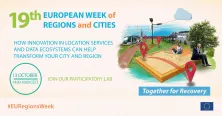
Background and scope
The study Leveraging the power of location information and technologies to improve Public Services at Local Level – an EU-wide analysis was launched by the Digital Economy Unit of the Directorate Growth and Innovation of the Joint Research Centre in the framework of the ELISE Action of the ISA2 Programme to explore and better understand how location data and technologies can help to deliver better public services at the local and regional levels, creating value for citizens, businesses and governments alike. The study considers many factors, including interoperability, user-centricity, innovation and maturity, replicability and scalability, amongst others.
The main objective of the proposed project is to investigate the innovative use of location data and technology at local and regional levels in the European Union to increase the quality of public services and produce public value. To achieve this aim, the following specific objectives and activities have been defined:
- a systematic review of the state of the art on the innovative use of location data and technologies for delivering public services in the EU;
- development of a conceptual framework for assessing the current and potential impact of the use of location data and technologies on public value creation through public services at the local level;
- an extensive study of ten cases to refine, tailor and validate the conceptual framework for different real-life contexts and applications;
- Work with stakeholders (local authorities, businesses, citizens) to get insight into current practices and to validate the findings in workshops and a policy lab;
- Outline future research and policy recommendations that emphasise governance models with relevant structures and associated roles, responsibilities, and resources.
Outcomes of the research
- A systematisation of the State of the Art on the innovative use of location data and technologies for delivering public services in the EU, including an overview and possibly geo-referenced presentation of where the most promising "success stories" and emerging ideas are located. [Get the state of the art report].
- A conceptual framework for assessing the actual and the potential impacts of using location data and technologies on public value creation through public services at local and regional levels.
- The design, execution and validation of at least ten extended case studies illustrating the replicability and scalability potentials of services benefitting from geospatial data or location intelligence at different levels of public administration and in different government functions. Case studies are selected based on their potential to add public value across the EU and the likelihood to drive transformative changes.
- A set of 'actionable' research and policy recommendations on the innovative use of location data and technology to improve public services at the local level by proposing alternative pathways to new governance models and engaging an EU-wide community of recognised experts drawn from a range of academic disciplines and practices
The outcomes of the study will be collected in a Final report, which will be integrating the results of the State of the Art analysis, presenting the validated conceptual framework, including the theoretical orientations and findings from the review of the State of the art and future pathways which underpin its development, as well as the results of the analysis of the case studies. The report will also summarise the key outcomes of the interaction with the group of scientific experts and experts from practice.
Additional information
The best practices and case studies will be documented, and a visualisation tool will be made available to query and coherently present them.

Report: Leveraging the Power of Location Information and Technologies to Improve Public Services at the Local Level




